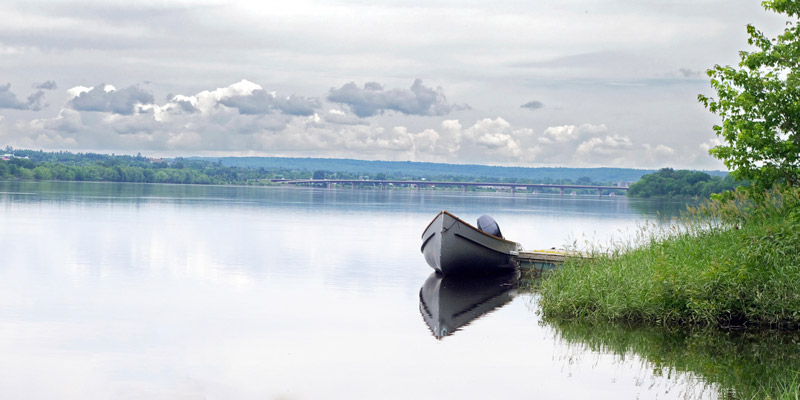Coupling Between Rivers and Alluvial and Fractured Bedrock Groundwater Flow Systems
Principal Investigators - Kerry MacQuarrie, Professor, University of New Brunswick and Tom Al, Professor, University of New Brunswick, (2001-2004)

Challenge
Because of their proximity to large populations, alluvial aquifers, which are commonly found in river valleys, are acquiring increasing importance as drinking water sources. However, any groundwater pumping could induce recharge from nearby rivers or underlying fractured bedrock, which has been associated with a variety of water quality concerns, including elevated iron, manganese, microbial pathogens, organic contaminants, and trace elements such as arsenic. In order to better manage these water resources, there needs to be an improved understanding of the processes controlling water quality in such aquifers. The primary goals of this project were to investigate the physical, geochemical, microbiological, and water supply management issues related to river valley aquifers.
Project
Throughout the project, the researchers assembled a unique data set consisting of geophysical, hydraulic, microbiological, geochemical, and isotopic information. Field investigations were conducted in a major municipal water supply aquifer in Fredericton, New Brunswick, which was considered to be representative of similar river valley aquifers.
Unique applications of geophysical techniques revealed the subsurface geological conditions that control the spatial distribution of river water into the aquifer. Physical studies indicated that water travel times between the river and municipal wells were lower than those used in engineered slow-sand filtration, though, for several months of the year, cold water temperatures can influence natural processes that affect water quality. Meanwhile, geochemical studies revealed significant seasonal variations in the concentrations of redox-sensitive species, and overlap of these reactions in space. Microbiological studies revealed that no single group of naturally-occurring aquifer bacteria dominate any one particular zone of sediments. Rather, the bacteria are relatively uniformly distributed. In order to assess water supply management issues, isotopic and trace metal analytical methods were employed to identify recharge water sources for individual production wells, while studies of the underlying fractured bedrock formation assessed physical properties. Out of this, a framework was developed that evaluates tradeoffs among alternative combinations of source water and treatment options.
Outputs
Development of a pumping, treatment, and maintenance cost model that is generally applicable for evaluating water supply/treatment alternatives. The framework considers the cost of the various treatment alternatives, as well as pumping and monitoring costs; the water quality reliability of the water supply system; the risk of contamination due to pathogens and the resulting risks to human health; and the available water yield.
Many conference papers, presentations and student theses were generated as a result of this project, of which a select few are listed below:
Conference Papers
Nadeau, J.-C., Butler, K.E., and Parrott, R., 2003. Application of riverine geophysics for delineating recharge to a river valley aquifer – Fredericton, NB. Proceedings, Symposium on Application of Geophysics to Engineering and Environmental Problems (SAGEEP 2003), San Antonio, Texas, April 6-10, 2003.
Abstracts/Conference Presentations
Amskold, L., and Al, T., 2003. Groundwater chemistry in the Fredericton aquifer, Fredericton, New Brunswick: Preliminary results. Connecting Water Resources: Canadian Water Network 1st National Symposium. Saint John, NB, March 23-27, 2003.
Butler, K.E., Parrott, R., Hughes-Clarke, J.E., and Daigle, A., 2002, Delineating river-bottom recharge to the Fredericton aquifer by seismic and electrical imaging, Atlantic Geoscience Society Mtg., Antigonish, NS, Feb. 8-10, 2002.
Daigle, A., 2002, Resistivity imaging through a recharge zone for the Fredericton aquifer, invited presentation, 55th Annual Conference of the Atlantic Canada Water Works Association, Fredericton, NB, Sept. 22 – 24, 2002.
Student Theses
Cunningham, C. A., 2002, Geochemistry of groundwater from bedrock underlying the Fredericton aquifer, B.Sc. honours thesis, University of New Brunswick, Department of Geology
Daigle, A., 2002, Resistivity imaging through a recharge zone for the Fredericton aquifer, undergraduate report in geological engineering, University of New Brunswick.
Chow, Song Wei, 2003. Suppression of water-bottom multiples in shallow seismic data by predictive deconvolution, B.Sc. thesis, University of New Brunswick, Department of Geology
Outcomes
- International significance, as estimates suggest that over 63 million Americans could be supplied from such water sources. Similarly, in central Europe, the concentration of populations in river valleys has led to extensive development of alluvial valley aquifers. This research program represents one of the best integrated and most comprehensive research programs on river valley aquifers to date.
- In terms of economics, the primary benefit of the research will be improved management of public drinking water supplies in alluvial valley aquifer systems. This translates to long-term financial benefits to municipalities and their citizens. Research in water extraction alternatives should help to identify what methods are most sustainable and economical for municipal water supply.
- Canadian water quality-consulting sector will benefit from being able to draw upon the basic knowledge and highly qualified personnel involved in the research. As well, an improved understanding of the biogeochemical processes in river-recharged aquifers could lead to technologies that utilize low-cost, passive in situ methods to remove select contaminants.
- Properly developed models will provide greater insight into processes, and are also one of the primary means by which knowledge can be transferred to other researchers and end users.




